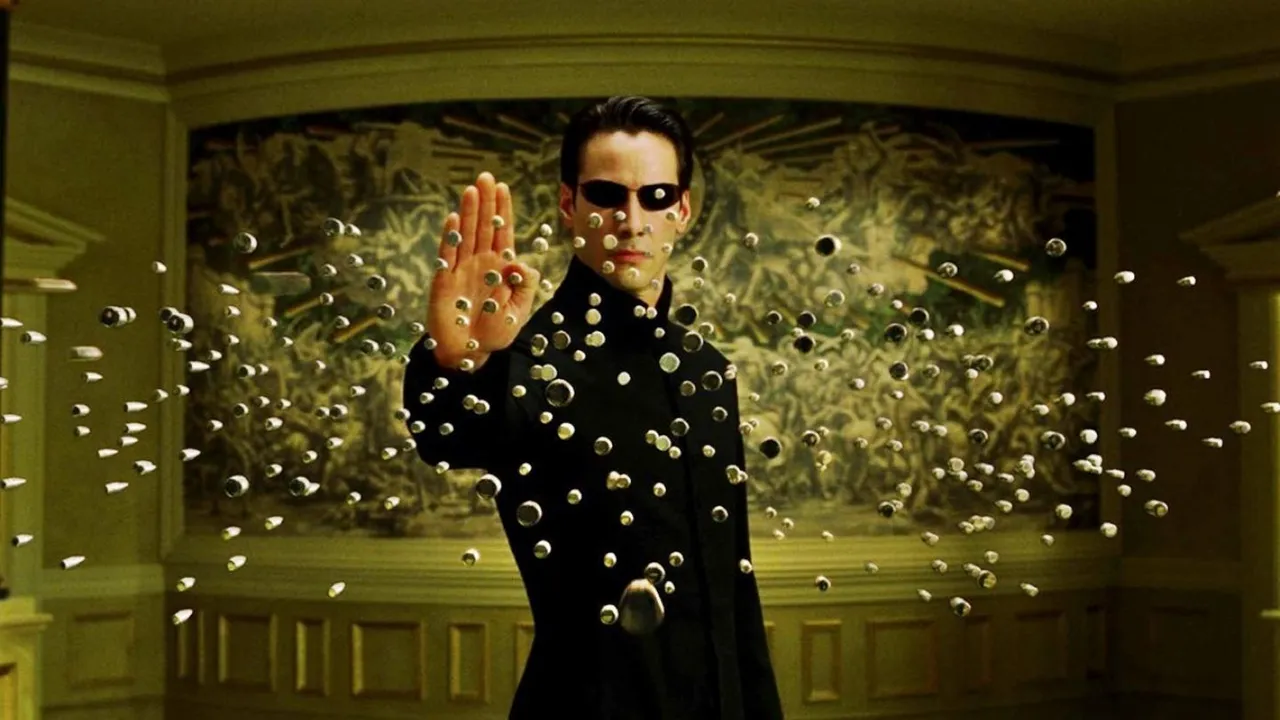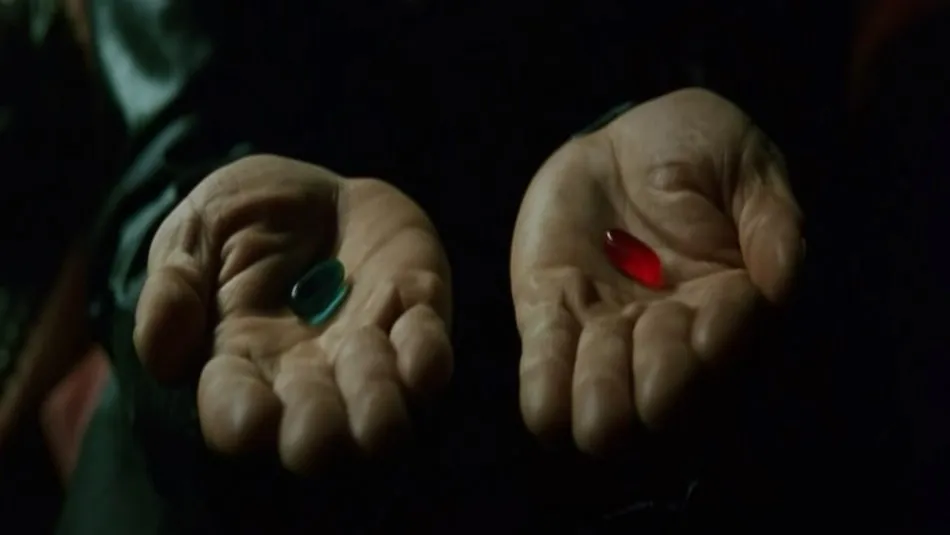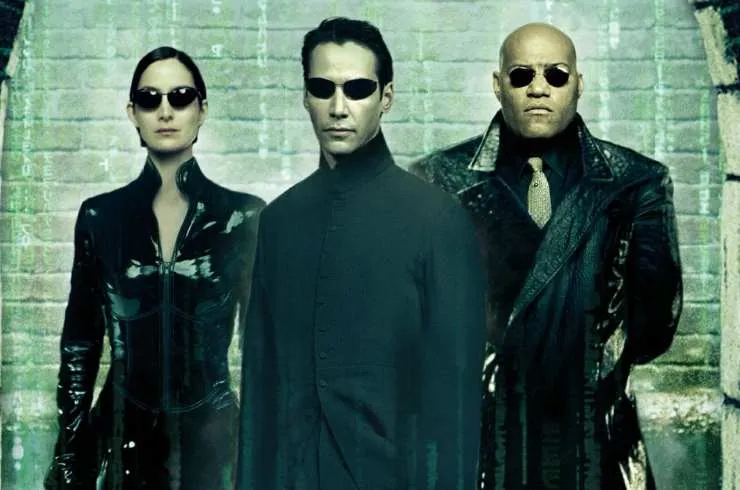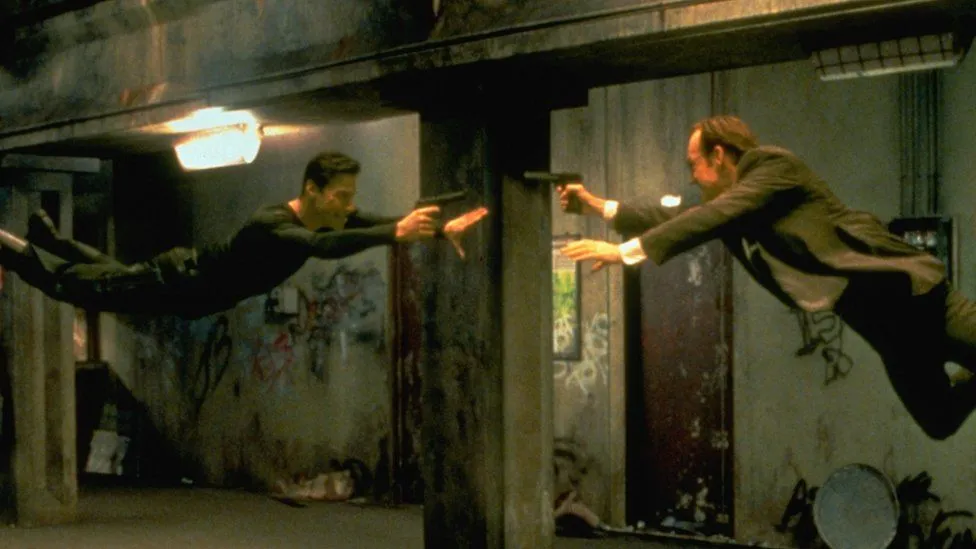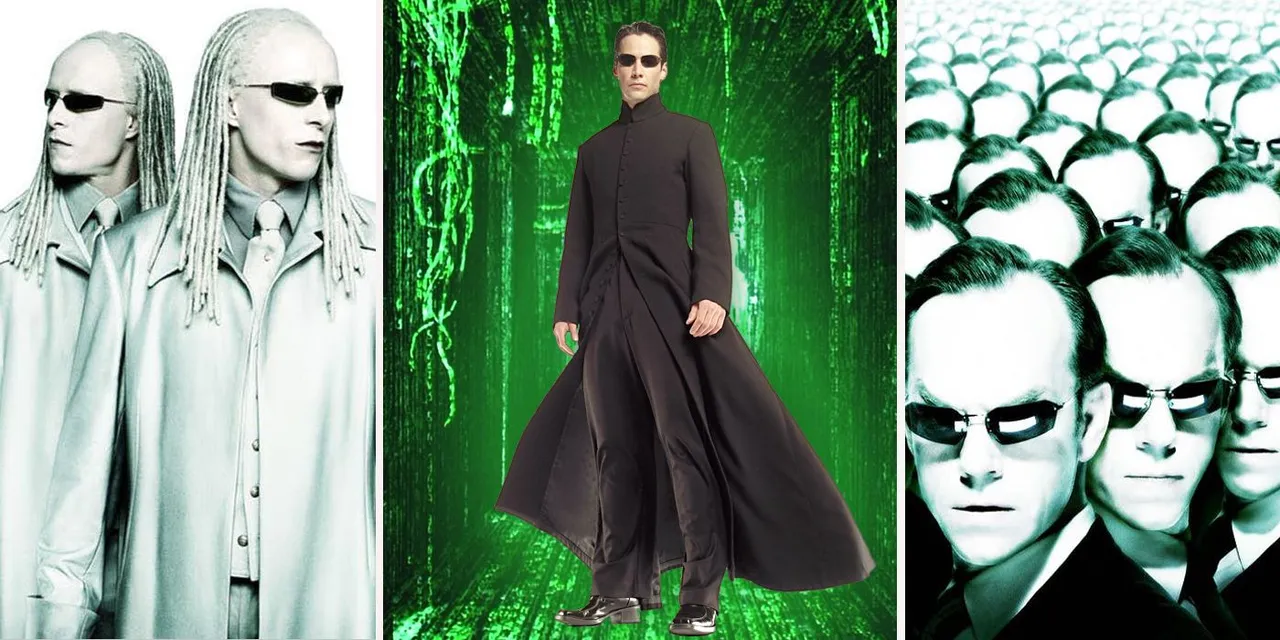Wait a second here... Wasn't The Matrix a motion picture, and not a TV series? How are you even supposed to binge-watch it? True, its first incarnation in 1999 was a film indeed. But its immense success (and subsequent riches) had to be milked for all it was worth, bringing out a sequel, then a third movie to complete the trilogy. Then, almost two decades later, a fourth sequel was added, turning the entire piece into something more akin to a mini-series (with the annoyingly stupid titles Reloaded, Revolutions, and Resurrections). In fact, I'm sure the story would have taken the form of a series, had they waited until today with bringing it out. But I guess around the turn of the millennium film trilogies were still considered the highest form of visual art.
Philosophical Origins in the World of Cyberpunk
The interesting concept behind the - admittedly flat - story can be summed up briefly: Everything we perceive as reality is in fact a computer simulation, created by artificially intelligent machines, who keep humans locked in pods to harvest their bodily energy. The few humans who have escaped this are trying to liberate others by offering them the choice in the form of two pills: the red one will wake you up, the blue one will put you back to sleep and make you forget all about it. The protagonist of the story is an unlikely character, thought to be "the one" who can finally defeat the machines, and whose struggle makes up most of these four films.
This existential question of what is real and what is imaginary, is of course much older than these movies. Even combining it with artificial intelligence and virtual reality, it goes back at least to the cyberpunk sub-genre of science fiction, a mix of advanced technology and regressed society that became popular in certain circles in the 1980's. This trend was by no means limited to comic books (though many interesting aspects of cyberpunk manifested themselves in form of serious graphic novels), as French philosopher Jean Baudrillard explored these same ideas in his treatise Simulacra and Simulation, which was taken as the basis of the Matrix movies.
An Appeal to the Wider Masses
While cyberpunk has always been readily available to anyone who was willing to open a book or sit down for a discussion, it never went out of its way to spread the word or to open people's eyes. Also, just like role playing games or graphic novels, by its weird and on-conformist nature it kept its appeal to a limited crowd, made up of those who were already somewhat familiar with its elements.
All this changed in 1999 when the original Matrix movie became a box office hit, reaching a wider audience, who may have come for the numerous guns, explosions, and martial arts, exaggerated way beyond what's realistic. Suddenly everyone was talking about the red and the blue pills, about our robot overlords, and certain errors in the matrix causing deja vues. As if this was not enough, the second and third move just kept adding to it, and the most recent revival is not any different either.
Just like so many people I know, I was thrilled by the first move, disappointed with the second, and didn't even bother seeing the third. Now that the fourth one came out, I decided to binge on the whole 4-logy over four consecutive evenings. In the end the most recent release turned out to be as repetitive and uninspiring as I had expected. Its only saving grace, that I thought was a bit of a cute twist, was how the main character was a successful game designer who had created The Matrix trilogy, not as a set of motion pictures, but video games, and their parent company (of course WB, who else?) insisted on bringing out another sequel. In the end, this setting with so many parallels to our reality (wink-wink!) turns out to be just another simulation of the matrix, which everyone could guess, so it should hardly be a spoiler.
The Truth Is Clearly Not For Everyone
One of the things that got me into re-watching the entire quadrilogy of The Matrix actually came from a meme having to do with vaccine passports. First it made me laugh, while agreeing with it whole heartedly. But then I realized the message behind the message, which I have been noticing almost daily over the last two years: Most people are simply not ready for the red pill. No matter how easily we could tear down our shackles, discard our chains, and bring this whole system of exploitation crashing down, it simply won't happen, because so many of our contemporaries are perfectly fine with being caged, and even if you present them the truth on a platter, they will just revel in the accompanying explosions, before going home to masturbate.
So yeah, once again I had to realize that the futuristic concepts of cyberpunk are best kept right where they came from: among nerdy kids playing RPG in dusty book shops, and obscure sci-fi graphic novels dealing with mind-blowing ideas. Because they are perfectly fine for those red-pill-types seeking an answer, an explanation, the truth if you will, which of course we must discover for ourselves, even if shared within a group. And I am the best example: those who are really interested will find it. As for everyone else... I'd say these concepts are wasted on them. The four Matrix movies illustrate this perfectly.
Take a Look at the Previous Posts in my Binge On This Series:
Green Wing: Another One With The Badness Quality
Living With Yourself: So Bad, It's Actually Quite Good
Episodes: British Humor About an American Sitcom
Peaky Blinders: Thug Life in 1920's Birmingham
Sense8: The Most Colorful Ensemble Cast
StartUp: Not For Learning About Crypto!
Chernobyl: An Apocalyptic Documentary
The Handmaid's Tale: A Not Too-Far-Off Dystopia
Twin Peaks: The Return - The Series Closing After 25 Years
Silicon Valley: Humor from the World of Tech and Money
Dark: Intense Time-Travel for Germanophiles
Twin Peaks: The Show That Changed Everything
The Man In the High Castle: What if the Nazis Had Won?
Lost: Mystery With Addictive Potential
Babylon Berlin: Sociopolitical Tremmors in the Weimar Republic
Rome: A Realistic Sandal Series
Carnivàle: A Throw-back to the Thirties
Weeds: The Hillarious Alternative to Breaking Bad
Mr. Robot: Hackers, Freedom, and Mental Issues
Das Boot: A Real German WWII Series
Black Sails: Pirate Lore Galore
Twelve Monkeys: Time Travel and Pandemic
The DocsMX 2020 Film Festival
